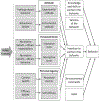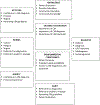Lack of education, knowledge, and supplies are barriers to cryptococcal meningitis care among nurses and other healthcare providers in rural Uganda: A mixed methods study
- PMID: 37390523
- PMCID: PMC11138314
- DOI: 10.1016/j.nedt.2023.105873
Lack of education, knowledge, and supplies are barriers to cryptococcal meningitis care among nurses and other healthcare providers in rural Uganda: A mixed methods study
Abstract
Background: Cryptococcal meningitis (CM) is one of the deadliest opportunistic infections related to HIV/AIDS. A research gap exists surrounding the barriers to CM diagnosis, treatment delivery, and care from the healthcare provider's perspective.
Objectives: The purpose of this study was to elucidate provider's behaviors, to identify barriers and facilitators to diagnose and treat CM, and to assess their knowledge of CM, cryptococcal screening, and treatment.
Design, setting, and participants: A convergent mixed-methods study among twenty healthcare providers who provided CM patient referrals to Lira Regional Referral Hospital in Lira, Uganda.
Methods: Surveys and interviews were conducted to obtain information from healthcare providers who referred CM patients to Lira Regional Referral Hospital from 2017 to 2019. Questions related to provider education, knowledge, barriers to CM care, and patient education were inquired to understand the providers' perspectives.
Results: Nurses had the least amount of CM knowledge with half knowing the cause of CM. Approximately half the participants knew about CM transmission, but only 15 % knew the duration of CM maintenance therapy. Most participants (74 %) last had education regarding CM during didactic training. In addition, 25 % disclosed they never educate patients due to time constraints (30 %) and lack of knowledge (30 %). Nurses (75 %) were least likely to provide patient education. Most participants acknowledged their lack of CM knowledge and attributed it to a lack of education and perceived inexperience with CM.
Conclusions: Providers' gaps in knowledge due to the lack of education and experience contributes to decreased patient education, and the lack of access to appropriate supplies affects their provision for CM diagnosis, treatment, and care. These results can guide evidence-based interventions to improve health providers' knowledge. Recommendations for standardized CM education should be developed for both providers and patients in collaboration with professional boards and the Uganda Ministry of Health.
Keywords: Barriers to care; Cryptococcal meningitis; Healthcare providers; Mixed methods; Uganda.
Copyright © 2023. Published by Elsevier Ltd.
Conflict of interest statement
Declaration of competing interest The authors declare that they have no known competing financial interests or personal relationships that could have appeared to influence the work reported in this paper.
Figures
References
-
- Beagley L, 2011. Educating patients: understanding barriers, learning styles, and teaching techniques. J. PeriAnesth. Nurs. 26 (5), 331–337. - PubMed
-
- Center for Disease Control (CDC), 2018. Cryptococcus: screening for opportunistic infection among people living with HIV/AIDS. Retrieved from. https://www.cdc.gov/fungal/pdf/at-a-glance-508c.pdf.
MeSH terms
Grants and funding
LinkOut - more resources
Full Text Sources
Miscellaneous



